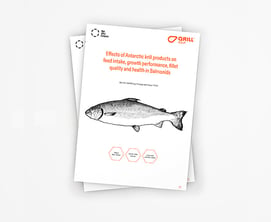Krill: a natural superfood for fish
Krill is found in all the world's oceans, and is a natural and highly nutritious food source for fish.
This tiny crustacean is rich in essential nutrients, including proteins, fatty acids and micronutrients which support healthy growth and resilience. Additionally, krill naturally stimulates fish appetite, ensuring they consume the maximum amount of beneficial nutrients. Its comprehensive nutritional profile—including essential vitamins, astaxanthin, and minerals—can enhance fillet quality and overall fish health when incorporated into feed.
One of krill’s most notable nutrients is phospholipids that carry omega-3 fatty acids. Cells require adequate omega-3 levels to maintain optimal health, and a diet high in omega-3 has been linked to improved fish welfare, particularly during periods of stress, such as disease outbreaks, delousing treatments, and environmental challenges.
Omega-3 fatty acids are crucial for the proper function of central organs, including the heart, gills, liver, and skin. When omega-3 is delivered in the form of phospholipids, it affects the uptake and distribution of the fatty acids in the fish. A greater amount of those valuable omega-3 fatty acids will reach important organs and contribute to healthier cells when in phospholipid form. This, in turn, helps the fish withstand stress. The phospholipids in krill are also carriers of choline.
Choline is a vitamin-like substance that has recently been shown to be essential for the absorption of fatty acids, including omega-3 from the gut. Choline is also important for cell function. In addition to being a good source of phospholipids and omega-3, krill possesses several other nutrients that are important for fish health. The proteins found in krill have a perfect balance of amino acids, which helps to build up cells and tissue in the fish.
The amino acids are important for the formation of muscle tissue, immune cells, as well as all the other cells with essential bodily functions. Krill is also rich in natural antioxidants and other important vitamins and minerals that help protect tissue from damage and strengthen the immune system. Recently another range of nutrients has entered the spotlight in salmon nutrition.
These are the osmolytes, related to the fluid balance and health in the fish. Krill is rich in osmolytes like free amino acids and TMAO and this may be part of the explanation why krill is so beneficial in fish feeds. The discovery of the importance of these osmolytes highlights that there is still a lot we have yet to explore on the nutrient requirement of salmon. Using krill as a in the feed is a safe way of ensuring that salmon gets a range of nutrients and benefits it needs to grow and stay healthy and be a superior and sustainable food for humans.
Watch the film to learn more about krill and the immune system:
Immune system
Salmonids review paper

